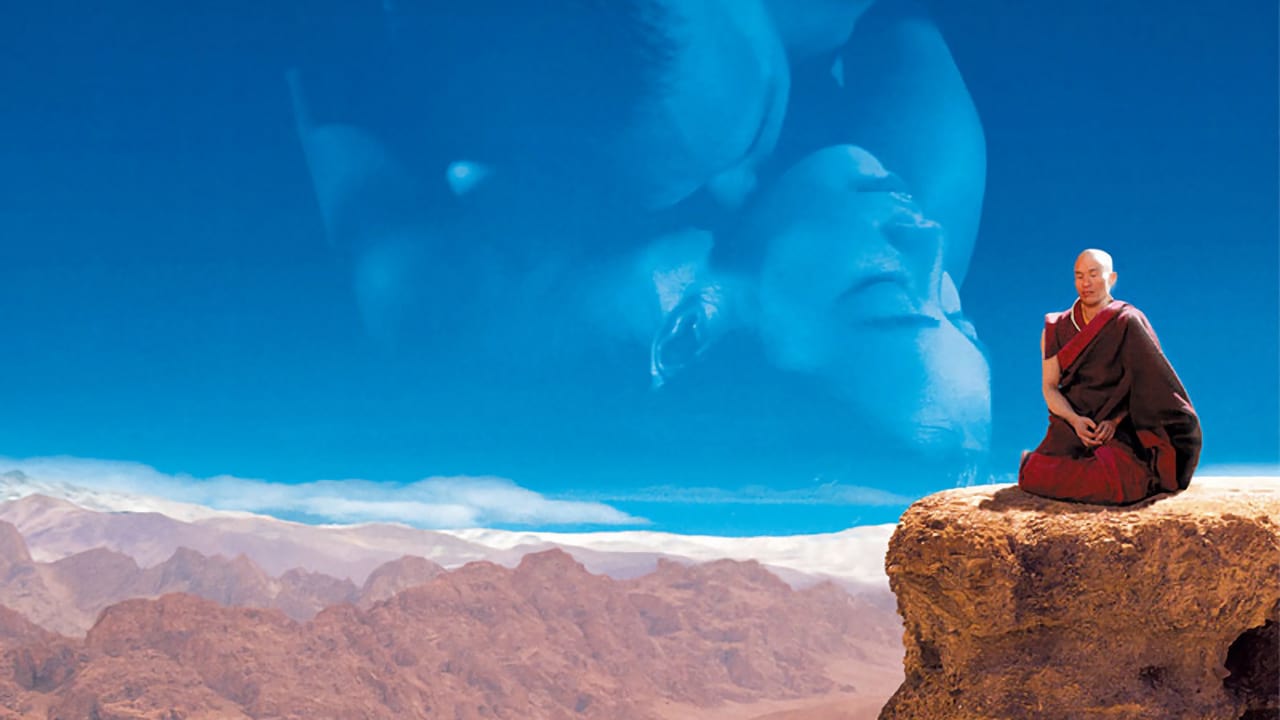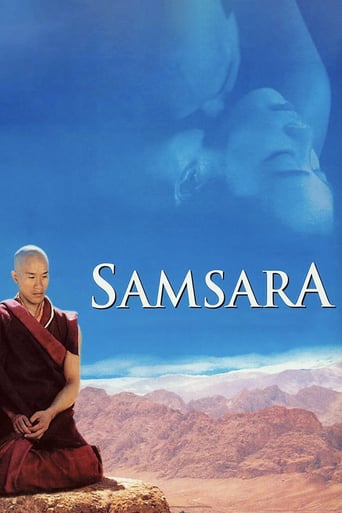

The film "Samsara" was made as a result of the collaboration of many countries: India, France, Italy, Germany, and thus, of many cultures. Nevertheless, the outcome turned out to be quite authentic in relation to Asian culture and Buddhist traditions specifically. If you are already familiar with Asian films, this movie would not surprise you with its pretty slow pace, absence of dynamics and vivid actions, but clear philosophical message. The idea of the film is in its name, i.e. "Samsara". The main character goes all the way through ascetic way of life to the obtaining a family with the only one purpose - reach the enlightenment and get out of these infinite cycle of births, deaths and human sins. What is important here is that this monk, whose name is Tashi, have chosen to reach the Dharma in unusual way. He decides for himself that in order to cease all the cravings, it is important to firstly experience and feel them. And in my opinion, that is likely to be a right way to go in terms of accepting one religion or the other. At some point of studying Buddhism and how the Sangha is functioning, I, personally, asked myself: "Is it right that some newborns are given to the monastery so that they have no other choice rather than accepting Buddhism as their way of life? What if it is not what they would like to do in future, and everything they would do will not come from their hearts, but just would be the result of habit?" That turned out to be the case of Tashi. Even after meditating for 3 years, he could not achieve the enlightenment because his heart was still in searching for some pleasures. But when he finally reached it, he understood that now he wants more and more. And there, the main question of the whole movie comes: "What is more important: to please thousands of cravings or to get rid of one?" The answer to this is left to the viewers, as usually. What I liked in this film and what have not been mentioned in any Buddhist films that I have watched, is the importance of women, of wives in the society, and the egoistic nature of this so highly valued "detachment from everything". The wife of Tashi was there for him all the way through those difficulties in their life, but at the end of the day, he, like Buddha Sakyamuni, just left her with their son when he thought he was ready to achieve enlightenment. But nobody thinks that probably his wife was the first one to achieve it and was guiding him, but she was so full of compassion and that she cannot left everything she has. Can we call this enlightenment? Can we still undermine the role of women in Buddhism? So this was an important and unique idea that this movie has demonstrated. Overall, the film has several unique messages to think about, and for those who love philosophical movies, it is definitely a must-watch. I did not like the camera work, because it was not an aesthetically pleasant film to watch. I also expected that there might have been beautiful nature views, which were not depicted here, but are present in most of the Asian films. But probably, it was made intentionally to show the real life, but not just a pretty picture. Also even for me, a person who does not love action films, it was too slow. Some episodes could have been a little shorter in order not to lose the viewer's attention. But in general, I would recommend this film not to general audience, but to people who are probably struggling with finding themselves in life, or who are interested in Buddhism and Asian culture.
... View MorePan Nalin's debut takes us on an ambitious ride through many facets of man's life. I do not like to be spoon fed. The films visuals, its art direction, its costumes, its set decoration are really TOO MUCH. TOO PERFECT. They go beyond National Geografic, and end up near an ethnic VOGUE fashion shoot. The 'starring couple' are gorgeously repellent. The female lead is a local (?) answer to 'flavor of the decade' Angelina Jolie. The secondary characters are so expertly cast that you feel manipulated. This is a movie made for Americans. It is a Californian's daydream of exotic proportions. We are transported to something Disney would have loved to concoct, had he allowed sex to creep into his book-of-rules. what the film DOES succeed in, is in giving us a worthy 'finale'. A message which, after such a rally of clichés, comes as a welcome surprise. We hear a WOMAN's view-point! We learn a lesson. "You can and will find your spiritual path amidst people, in nature...just by LIVING." it is not necessary (or healthy) to retire to a temple, as a yogi, or a monk, in order to fulfill your spiritual aspirations. So, it comes as a pity that such a good message should be served up with cynical, glossy manipulation by the director. Bertolucci gave us a typically Italian visual overkill with 'Little Buddha', but Pan Nalin just couldn't resist giving the Indian Tourist Board a brisk business boost. All I felt is..."Oh God! More hordes of tourists will be squirming at home, desiring a slice of all that exotic, stylish Nepalese decor. More authentic plates, mirrors, instruments etc. will be sold off to N.Y. lawyers' wives for good $$$.... and , goodbye to what little is left of this wonderful corner of the planet.!" And Pan Nalin is , no doubt wondering how to pay his Mulholland Drive rent. His next film may give us the answer.
... View MoreI just wanted to express my gratitude to Pan Nalin and the entire cast and crew of "Samsara" for creating this brilliant film. I have watched it many times by now and it's one of my favorites. Being Bulgarian, I am also proud that there's a significant contribution of Bulgarian artists to the production. But "Samsara" wasn't just a *good film experience* for me, and that's the reason I write this. It changed me.Everyone has a path in life and we all discover different signs along the path."Samsara" was a sign for me.The story, the music, the visuals... something happened in my mind that is beyond my ability to explain. Truth is beyond words and that is the purpose of making art - to try and capture a *feeling of truth* and transmit it in an earthly, impermanent form - a poem, a song, a kiss, a film."Samsara" touched me and helped me.Thank you for this.I'm looking forward to your new creations.
... View MoreI found this movie, a very interesting and meaningful. There were not more than 100 words went on in this movie but the picture itself, gave the viewer many things to think about. What Tashi really did was reversing the Buddha path. Buddha was the one normal human being before he realize the need to discover what life is all about, what he discovered was suffering in living one life. He tried to find the ways to settle with all the suffering, not by avoiding but realize that there are suffering and and he faced it in the noble way.Tashi, however, live his life in the monastery, believe in something he was told to believe not something that he discovered himself. Every human has the feeling of sexual awakening at one point of time, what Tashi did was that he quit the monk-hood, partly because the guiltiness of having such feeling but at the same time desire to discovered the reality for himself. HE entered into the life and began to discover with all the truth in the world, full with desire, anger, jealously, deception etc. but at the same time he discover love, caring, warmth, and happiness. The decision he chose, for me, he was running away from suffering by going back to peace and serenity of being monastery. What he did was not totally right or totally wrong but it does suggesting something. HE is avoiding all the desire that always backfire him throughout the movie. Pema came to him and enlighten him with her thought. Enlightenment does not mean that you have to quit all the normal life and being alone in the temple to cut all the desires. Maybe what make you enlightened is the fact that you stay in life and faced the suffering in the acceptable noble ways. Maybe it is satisfy most of the need but at the same time conquer your own self.
... View More